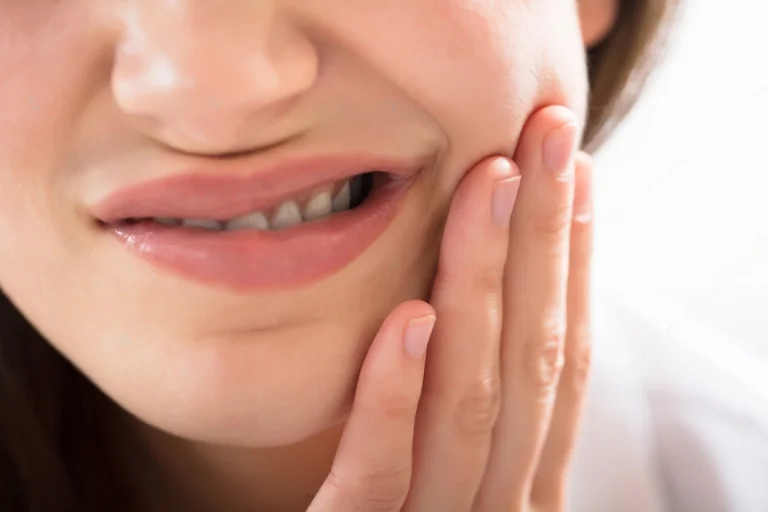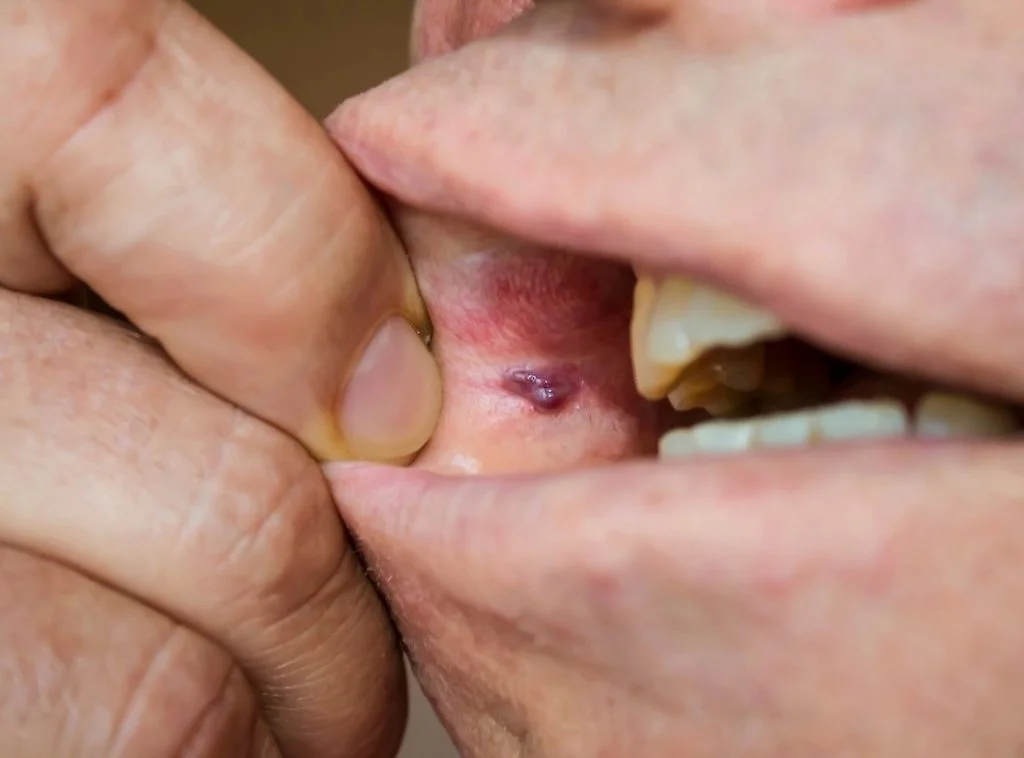
- Home
- About
- Our Team
- Services
- Postoperative Care
- Smile Gallery
- Medical Tourism
- Blog
- Offers
- Contact Us
- Home
- About
- Our Team
- Services
- Postoperative Care
- Smile Gallery
- Medical Tourism
- Blog
- Offers
- Contact Us

Have you ever accidentally bitten the inside of your cheek while eating or speaking? It can be a traumatic experience that makes you wonder why it happened at all. If you have been getting frequent inner cheek bites, there may be underlying causes that you should be aware of.
Inner cheek bites, often known as cheek bites or cheek chewing, are frequent and can affect anyone. At the same time, it may appear to be a minor issue; chronic cheek biting can cause discomfort and even harm. Understanding the reasons and treatments for inner cheek bites will help you avoid having this problem in the future.
Whether you are a casual cheek chewer or have chronic bouts of cheek chewing, this blog will provide you with the knowledge that you need to manage this behavior correctly. By better understanding this practice, you may take preventative measures to avoid issues and safeguard your dental health.
Inner cheek biting is a lesion by accident in which you bite the inside of your cheek, typically when eating, chatting, or sleeping. It produces instant discomfort, swelling, and sores or ulcers.

Accidental cheek-biting: Inadvertently occurs when eating or chatting, frequently as a result of diversions or rapid eating.
Habitual cheek biting: Repetitive biting is frequently associated with stress or anxiety.
Sleep-related cheek biting: This occurs during sleep, most usually as a result of teeth grinding (bruxism).
Chronic cheek-biting: Persistent biting that causes sores and ulcers, generally owing to unresolved habits or dental problems.
Orthodontic-related cheek biting: Caused by dental equipment such as braces or retainers, particularly during the first adjustment.
Orthodontic Concerns: Misaligned teeth or a bad bite (malocclusion) might increase the chance of cheek bites. When your teeth do not fit together correctly, it is easy to chew on your cheek by accident.
Wisdom teeth: These latecomers might throw other teeth out of position, resulting in more frequent cheek bites.
Multitasking: Eating while conversing or being preoccupied may lead you to bite down wrongly.
Fast eaters: Those who eat rapidly are more susceptible to unintentional cheek bites.
Habitual biting: Some people acquire the habit of biting their cheeks when irritated or anxious, which is comparable to nail biting.
Bruxism: Grinding or clenching your teeth at sleep can cause cheek bites.
Pain and discomfort: Sharp pain immediately after the bite, followed by a dull ache.
Swelling: The afflicted region may develop swelling and tenderness.
Ulcers or sores: Repeatedly Biting can lead to white or red lesions or ulcers.
Bleeding: Initial bite may result in minimal bleeding.
Preparation: Combine a teaspoon of salt with a cup of warm water.
Usage: Rinse your mouth many times each day to keep the incision clean and limit the chance of infection.
Application: Place a cold compress or ice pack on the outside of your cheek.
Benefit: Helps to minimize swelling and numb discomfort.
Medications: Ibuprofen, acetaminophen, or aspirin may be utilized.
Function: To relieve pain and minimize inflammation.
Products: Use numbing gels or ointments formulated particularly for oral sores (such as Orajel or Anbesol).
Application: Apply immediately to the afflicted region to relieve discomfort and preserve the wound.
Brushing: Brush your teeth twice a day and be cautious around the afflicted region.
Flossing: To keep your mouth clean and infection-free, floss on a regular basis.
Diet: Consume soft, non-irritant meals such as yogurt, mashed potatoes, and smoothies.
Avoidance: Avoid hard, crunchy, or sticky foods that may irritate the sore.
Food and Beverages: Avoid meals and drinks that are spicy, acidic, or hot since they might aggravate the wound.
Tobacco and alcohol: Avoid smoking and consuming alcohol since these might impede the healing process.
Water: Drink lots of water to keep your mouth hydrated and aid in healing.
Mouthwash: To keep your mouth clean and avoid irritation, use an alcohol-free mouthwash.
Observation: Keep an eye on the bite to make sure it heals correctly.
Doctor’s Visit: Seek medical attention if the bite exhibits indications of infection (e.g., pus, significant swelling, or fever) or does not heal within two weeks.
Bruxism: If you grind your teeth at sleep, try using a night guard to avoid more cheek bites.
Chew Slowly: Eat slowly and deliberately to prevent taking unintentional bites.
Stress Management: If you tend to bite, try stress-relieving activities like meditation, exercise, or talking to a therapist.
Following these techniques can help you control the pain of an inner cheek bite and encourage speedier recovery. If your symptoms persist or worsen, you should see a doctor.
Conscious chewing: Eat carefully and attentively, paying close attention to your meal to avoid accidentally biting your cheek.
Orthodontic Assessment: Visit a dentist to check for any tooth misalignments or orthodontic abnormalities that may be contributing to cheek biting.
Stress Management Techniques: To reduce stress-induced cheek biting, try deep breathing techniques, meditation, or yoga.
Nighttime Protection: If you grind your teeth while sleeping, a night guard or mouth guard might help protect your cheeks from unintended bites.
Oral Hygiene Maintenance: Maintain a consistent oral hygiene practice, including brushing and flossing, to maintain your mouth healthy and limit the chance of cheek irritation, which can lead to biting.
Inner cheek biting can be a painful and annoying condition, but with proper care and attention, it can be handled appropriately. Addressing this condition as soon as possible helps avoid difficulties and encourage speedier recovery. Adopting preventative steps can minimize the likelihood of future occurrences, increasing your overall comfort and dental health. If the condition persists, get expert help to rule out any underlying causes. Prioritizing your dental health can lead to a more pleasant and pain-free lifestyle.
A minor cheek bite typically heals within 7 to 10 days, depending on the severity of the injury and individual healing factors. Maintaining good oral hygiene is crucial during this time. If healing takes longer or shows signs of infection, consult a healthcare professional for further evaluation.
Chewing on your cheeks may be a subconscious habit linked to stress or anxiety, providing a temporary distraction or relief. It can also stem from boredom or as an automatic response during deep concentration. Identifying triggers can help in reducing this behavior over time.
Biting your cheeks can lead to irritation, sores, and infections if done repeatedly. Chronic biting may cause damage to the oral mucosa and contribute to conditions like morsicatio buccarum. If you find yourself frequently biting your cheeks, it's advisable to seek professional guidance for management.
Accidental cheek biting often occurs due to distractions while eating, such as talking or multitasking. It can also result from stress or anxiety, leading to compulsive behaviors. If this happens frequently, it may be beneficial to consult a dentist regarding potential dental issues like malocclusion.
People bite their cheeks for various reasons, including stress relief, anxiety management, or as a habit during moments of concentration or boredom. Misaligned teeth can also lead to accidental bites. Understanding the underlying cause is essential for addressing this behavior effectively.
To stop biting your cheek in sleep, consider using a mouthguard designed to prevent teeth grinding and cheek biting. Additionally, practicing relaxation techniques before bed can reduce anxiety and stress, which may contribute to this behavior. Consult a dentist for tailored solutions if necessary.
When you bite your cheek, rinse your mouth with warm salt water to reduce irritation and promote healing. Avoid further irritation by steering clear of spicy or acidic foods. If the biting is frequent, consider consulting a dentist for advice on potential underlying issues like misalignment.
You may keep biting your cheek due to a combination of factors such as stress, anxiety, or distraction while eating. This behavior can also stem from misaligned teeth (malocclusion) or habitual responses to boredom. Identifying triggers can help in managing this involuntary action.